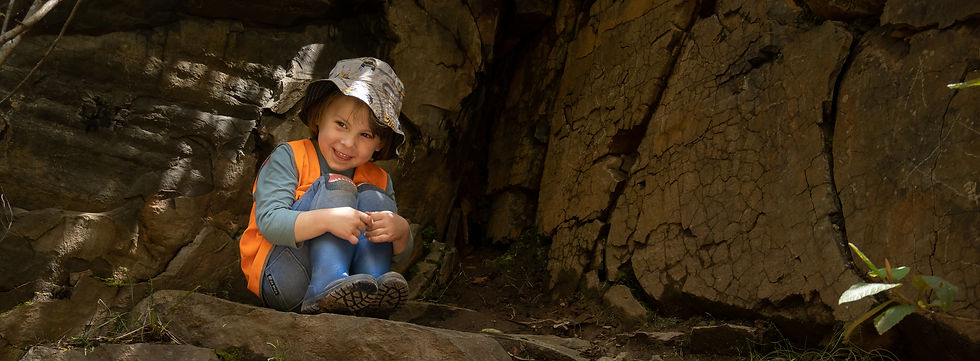
Nature connections: at our centre and in the bush

Our bush kinder program was developed to address a challenge facing children in our community: Anxiety. You might be surprised to hear that 14% of Australian children have a mental health condition in any given year. This is a growing international concern. When we add in the complexity of our changing lifestyles it became clear that our children deserved to be reconnected with nature, with our community, with each other and with themselves.
Substantive international research proves that regular time in unstructured natural settings decreases the stress hormone cortisol and increases serotonin - the happy hormone. At the same time helping to build resilience and strong healthy bodies and minds in both children and adults.
Before starting this program, children from our community fell behind state and national school readiness scores according to the Australian Early Development Census (AEDC). The latest census compiled in 2021 shows children from 'Kinglake Pheasant Creek' now rate above both state and national averages for school readiness across 4 of 5 developmental domains.
In 2021, Kinglake Ranges Children's Centre won the Victorian Early Years Award: Ministers Award for the outstanding success of this program.
Nature play has academic benefits at school:
A new report from the National Wildlife Federation, Back to School: Back Outside, shows how outdoor education and time is connected with wide-ranging academic benefits including:
-
Improved classroom behavior
-
Increased student motivation and enthusiasm to learn
-
Better performance in math, science, reading and social studies
-
Reduced Attention Deficit Hyperactivity Disorder (ADHD)
-
Higher scores on standardized tests
-
Help under-resourced, low-income students perform measurably better in school
Further researched-proved benefits of nature connections (including bush kinder) include:
-
Increased levels of internal motivation "Participants immersed in natural environments reported higher valuing of intrinsic aspirations and lower valuing of extrinsic aspirations, whereas those immersed in non-natural environments reported increased valuing of extrinsic aspirations and no change of intrinsic aspirations" (Weinstein N, Przybylski AK, Ryan RM, 2009)
-
Support for children with ADHD diagnosis: "Twenty minutes in a park setting was sufficient to elevate attention performance...Doses of nature nudge serve as a safe inexpensive widely accessible new tool in the tool kit for managing ADHD symptoms" (Taylor & Kuo, 2009, p 402)
-
Mental Health: initial findings indicate that nature plays a vital role in human health and wellbeing...implications suggest contact with nature may provide an effective population-wide strategy in presentation of mental ill health ...(Maller, Townsend Pryor, Brown, & Leger, 2006. p.45)
Articles supporting nature play
-
Scottish Doctors are administering 'nature prescriptions' in place of some medications to combat Chronic Health Illness
-
Back to school: Back outside: outdoor time boosts academic performance
-
Overprotective parents and teachers ‘ruining children’s play’ because of risk-averse lifestyles
Developing positive food habits for life.
Our vegetable gardens help to foster an understanding of where food comes from, how we grow it, harvest it then make and share it. It helps children connect with nature on a different level, developing positive food habits for life.
Noticing the details.
Its amazing what you can see in nature. What you notice when you really look. Where might your imagination go...Dots on the underside of ferns...spores or fairy eggs?
In our experience, the longer children are immersed in nature, the more they notice the detail. This in turn is reflected in their development: more detailed drawings, more detailed vocabulary, more complex play.

Australia’s roots are in the great outdoors
Enjoyment of and connection with the outdoors is part of the Australian identity. It is something unique and special about Australia and should be celebrated in all children’s services. (Early Years Learning Framework, 2022).
Bush play
Inspired by current research that supports the remarkable range of positive impacts from frequent, unstructured play in rich, diverse natural settings, we have developed our own bush program to entice children of Kinglake to explore the wonderful natural bush land settings we call home.
We aim to connect children and our Educators with nature, foster a growing understanding of Taungurung and Wurundjeri perspectives, build a love for the natural world, and inspire them to become true future custodians. We aspire to expose children to a raft of learning opportunities simply not available indoors.
Benefits of Bush include:
-
Resilience, resilience, resilience!
-
Increased social skill development
-
Increased inter-gender play
-
Imagination, creativity, problem solving
-
Fostering a love of the environment (Environmental custodianship)
-
Increased understanding about sustainability
-
Increased understanding of Aboriginal perspectives in particular the Taungurung and Wurundjeri peoples
-
Development of detail in children's work
-
Development of fine and gross motor skills




Community Connections
A huge thanks to the following Kinglake Businesses and professional colleagues who have helped support our bush kinder program:
-
Parks Victoria
-
Integrity Reasestate (donation of signs)
-
Pheasant Creek Stockfeed (donation of gumboots)
-
Murrindindi Library (showcasing photographs taken by children)
-
Alexander Kindergarten (for inviting us to see what bush kinder was all about)
-
Doug Farragh and Westgarth Kindergarten (for your encouragement, guidance and advice)
-
Aunty Lee Healy and Buxton Primary School (for teaching us about the Taungurung Language and bush foods)
-
Kinglake branches of Bendigo Bank, Lions and Rotary, for the provision of a 12 seater mini bus and anchored 6 point child harnesses which we use to transport children to and from our bush kinder sites.
-
Dixons Creek Primary School (for vision in 2018 and sharing your story: Parent Trees are Talking)
